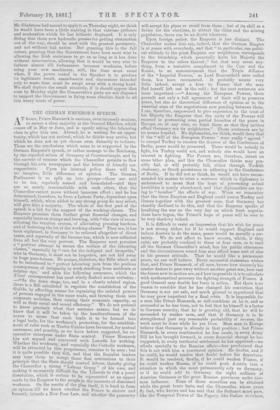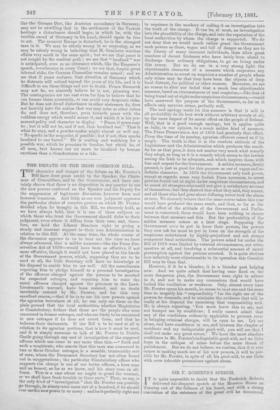THE GERMAN EMPEROR'S SPEECH.
AT home, Prince Bismarck is anxious, even intensely anxious, to secure a clear majority at the General Election, which comes off in May or June, and is openly asking the labouring class to give him one. Abroad, he is waiting for an oppor- tunity, which has not arrived, which he thinks may arrive, but which he does not as yet choose even distantly to indicate. Those are the conclusions which seem to us supported by the German Emperor's speech, or rather message to the Reichstag, by the reported action of Germany at Constantinople, and by the current of rumour which the Chancellor permits to flow through his own newspapers and the letters of friendly cor-
respondents. Upon his internal policy there will be, we imagine, little difference of opinion. The German
Parliament is so split up into groups—there are said to be ten, regularly named and formulated—and they are so nearly irreconcilable with each other, that the Chancellor cannot move without immense effort ; and he has determined, therefore, to form a Labour Party, dependent upon himself, which, when added to any strong group he may select, will give him a majority. The whole of the first part of the speech is a bid for the support of the working-classes. The Emperor promises them further groat financial changes, and especially taxes on stamps and brewing, with "the view of recon- stituting the taxation system, of alleviating pressing burdens, and of bettering the lot of the working-classes." They are, it has been explained, in Germany to be relieved altogether of direct taxes, and especially of the Income-tax, which is now collected from all but the very poorest. The Emperor next promises a 4. positive attempt to secure the welfare of the labouring classes," especially by "care for the indigent and incapable," who in Germany, it must not be forgotten, are not hid away an huge poor-houses. He praises, therefore, the Bills which are to be introduced to "protect labouring men from the perilous consequences of incapacity, to work resulting from accidents or lie/pleas age," and adds the following assurance, which the Tones' correspondent has most wisely flashed across verbatim : —"In the same stage, too, and in a closely related region, there is a Bill calculated to regulate the constitution of the Guilds, by affording means for organising the isolated powers of persons engaged in the same trade, and forming them into corporate societies, thus raising their economic capacity, as well as their social and moral efficiency." We do not pretend to know precisely what that sentence means, but we do know that it will be taken by the handicraftsmen of the towns to mean that each trade is to be formed into a legal body, for the workmen's protection, for the establish- ment of rules such as Trades Unions have favoured, for mutual assurance, and possibly, as we have before suggested, for co- operative enterprise under State control. Prince Bismarck has not argued and conversed with Lassalle for nothing. Whether the workmen, and especially the Catholic workmen, will be attracted by this programme, remains to be seen ; but it is quite possible they will, and that the Socialist leaders may urge them to accept these first concessions to their principle that the State should control labour, thereby giving the Chancellor a strong "Labour Group" of his own, and making it excessively difficult for the Liberals to risk a penal dissolution, which as certain to be represented as an appeal made by the Emperor to the people in the interests of distressed workmen. On the merits of the plan itself, it is hard to form an opinion till we know whether the Prince is sincere and honestly intends a New Poor Law, and whether the peasantry
will accept his plans or recoil from them ; but of its skill as a device for the elections, to attract the cities and the mining population, there can be no doubt whatever.
Upon foreign policy, the Emperor is less distinct. The Chancellor makes him say, indeed, that the German Empire is at peace with everybody, and that "in particular, our politi- cal attitude to the great Empires our neighbours, corresponds to the friendship which personally knits his Majesty the Emperor to the rulers thereof ;" but that may mean any- thing, from a tentative compliment to the Czar and the Kaiser, to an announcement that the Triple Alliance of the "Imperial Powers," as Lord Beaconsfield once called them, has been recemented. It probably means very little indeed, except a hint to France that she may find herself left out in the cold ; but the next sentences are more important :—" Among the European Powers, there prevails not only a full agreement of their will to preserve peace, but also no theoretical difference of opinion as to the essential aims of the negotiations now pending between them.
I am, therefore, empowered to give expression to the trust of his Majesty the Emperor that the unity of the Powers will succeed in preventing even partial breaches of the peace in Europe, or, at any rate, so limit them as that they neither affect Germany nor its neighbours." Those sentences are by no means hopeful. No diplomatist, we think, would deny that if the "will of the European Powers " were really "agreed " to compel Turkey to execute the decrees of the Conference of Berlin, peace would be preserved. There would be nobody to fight, for Turkey could not, and nobody else would have an interest in fighting. The Powers are, therefore, intent on some 'other plan, and this the Chancellor thinks may pos- sibly fail, or will probably fail, either through Turkish obstinacy, or Greek persistence in adhering to the Conference of Berlin. If he did not so think, he would not have recom- mended his master to utter a sentence which in diplomacy is understood to mean that the hope of preventing acteal hostilities is nearly abandoned, and that diplomatists are try- ing to " localise" the effects of war. When we remember that the three Empires and England could coerce Turkey and Greece together with the greatest ease, that Germany has steadily declined to do this, and that the Emperor speaks of localising the war on the very day on which fresh negotia- tions have begun, the Prince's hope of peace will be seen to be very shadowy indeed.
It is difficult to resist an impression that his wish for peace is not strong either, for if he would support England and induce Austria to do the same, peace would be morally a cer- tainty. We do not affect to know secrets, which, if they exist, are probably confined to three or four men, or to read all the German Chancellor's mind, but his public utterances and the circumstances round him nifty afford some sort of clue to his present attitude. That he would like a permanent peace, we can well believe. Every successful statesman wishes that, and Prince Bismarck, of all men, knows how sincerely his master desires to pass away without another great war, how vast the forces now in motion are, and how impossible it is to calculate with mathematical accuracy the fighting strength of France. A good General may double her force in action. But there is no reason to consider that he has changed his conviction that Germany is not yet safe, and much ground to apprehend that he may grow impatient for a final crisis. It is impossible for a man like Prince Bismarck, so self-confident as he is, and so successful as he has been, not to feel that he himself is a factor in German security, that he is growing old, that he will be succeeded by weaker men, and that if Germany is to be strengthened past any reasonable probability of reverse, the work must be done while he yet lives. Most men in Europe believe that Germany is already in that position ; but Prince Bismarck, in every combination he has made, in every Army Bill he has brought forward, in every financial change he has suggested, in every territorial settlement he has approved—we allude specially to the Bosnian affair—has proclaimed that this is not with him a convinced opinion. Ile doubts, and if he could, he would resolve that doubt before his departure., It would be resolved, finally, if he could weaken France, if he could weaken Russia, if he could push Austria into a situation in which she must permanently rely on Germany. or if he could add to Germany the eight millions of Austrian Germans or the great Russian provinces under Ger- man influence. None of these securities can be obtained while the great truce lasts, and the Chancellor, whose years fly fast, who knows and has said that the Sultana must pm, like the Temporal Power of the Papacy, like Italian divisions, like the German Diet, like Austrian ascendancy in Germany, may not be unwilling that in the settlement of the Turkish heritage a disturbance should begin, in which he, with the terrible sword of Germany in his hand, should again be free to act. The moment Europe is disturbed, he is the strongest man in it. We may be utterly wrong in so supposing, as we may be utterly wrong in believing that M. Gambetta watches affairs very much in the same spirit ; but we see that peace is not sought by the readiest. path ; we see that " localised " war is anticipated, even in an utterance which, like the Emperor's speech, reverberates in every Court ; we see that, despite great internal risks, the German Chancellor remains armed ; and we see that if peace endures, that situation of Germany which he distrusts will extend beyond the years of his life, and it is difficult to see those things and not to doubt. Prince Bismarck may not be, we sincerely believe he is not, planning war. The contingencies are too vast even for him to believe that he can foresee them accurately, or can avoid very desperate risks. But he does not dread disturbance as other statesmen do, does not heartily hate the notion that war may arise as other rulers do, and does not, therefore, press towards peace with the ruthless energy which would secure it, and which it is his per- manent policy and character to display. "Peace, if peace may be ; but it will not be, and if not, then localised war." That is what he says, and a powder-maker might almost as well say, " No sparks in the magazine, if possible ; but if not, then sparks localised to one barrel." He is waiting and watching for a possible war, which he promises to localise, but which he, of all men, best knows can no more be localised by human exertions than a thunderstorm or a tide.



































 Previous page
Previous page